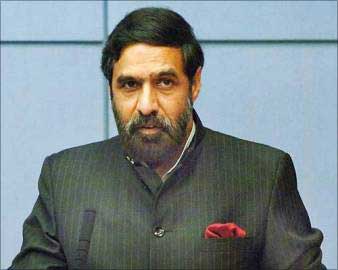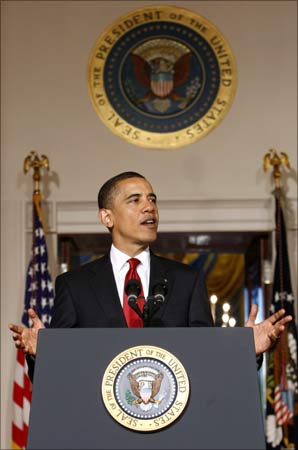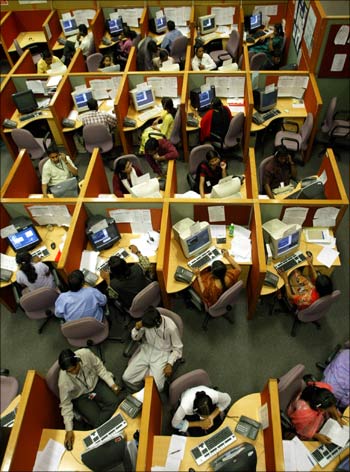
Union Minister for Commerce and Industry Anand Sharma has shrugged off the recent irritants that have cropped up less than six weeks before US President Barack Obama makes his visit to India as 'transient negativity', and predicted they would 'get dissipated' soon.
Sharma told rediff.com in an interaction that followed his appearance at the Council on Foreign Relations to deliver remarks on US-India Relations that the irritants -- from the US decision to hike the H-1B and L-1 visa fees to outsourcing being an issue that Obama himself has jumped on and the American business and industry's angst over the nuclear liability bill passed by Indian Parliament -- were developments that "Yes, sometimes end up creating transient negativity."
"I've used the word 'transient' because it will get dissipated," he asserted, and added: "It will hopefully get appropriately addressed when the larger picture is viewed. And that is what I urge also to the US Congressmen, that they should also have a balanced view as to what Indian investors, Indian industry has succeeded in creating."
On the issue of visas, Sharma acknowledged: "We have raised it; you're right. I have written to Ambassador Ron Kirk (the US Trade representative), and we have put it on the table. (But) We are engaged in a strategic partnership, and I have shared my view that we should do only what helps in strengthening and consolidating this partnership, because there is so much at stake here, from agriculture to nuclear and space sciences, when we are engaged."
. . .

He argued that the recent hiccups and irritants just weeks before Obama's visit "do not take away the enormous significance we attach to this partnership of the two big democracies. It's not only a dialogue, it's a partnership."
Sharma predicted that during Obama's visit he was "sure there will be many areas or deliverables, as we call it."
"Leaders have to look at the present," he contended, but spoke of how imperative it was that "we must not lose sight of the long-term objectives."
Going down memory land, Sharma said, "It started in 2005, 18th July, when the prime minister of India came here and signed what can be referred to as a historic joint declaration. Five years is a very short period for any society of country or in the history of relationship between countries. But so much has happened in these five years."
He said, with regard to these irritants, "We will address these issues, not look at them as what is referred to, because any language gives us many words. We have to be very careful in our choices. I won't refer to these as thorny issues. These are avoidable irritants, like what the Ohio outsourcing ban has been. And hopefully that will not happen."
"But we must not lose sight of the bigger picture," he reiterated.
. . .

Earlier in his remarks, Sharma took some hefty digs at the US Congress, which many believe for political expediency with mid-term elections pending and unemployment close to 10 per cent, have made outsourcing and H-1B and L-1 visas for Indian professions once again a convenient whipping boy, with the likes of US Senator Charles Schumer, New York Democrat, even disparagingly calling Infosys -- India's venerable IT conglomerate -- a 'chop-shop.'
Sharma said, "What must be recognised is that we live in a world which is very much different from the world which we have read about the first half of the last century, and it changed dramatically post-Second World War when the new technologies came, and those countries which were the beneficiaries of the first flash of technologies continued to benefit."
"But in the last two decades," he said, "it is the professionals, the scientists from the emerging economies, including India, who have made their own contribution -- I am referring to the IT sector and other related services sectors."
Sharma argued that "what needs to be fully recognised -- and I find that it is not -- that it's a two-way process when countries are engaged in partnership, when we invest in each other's economies, each other institutions."
He claimed that "it's the Indian industry which has sustained, saved or created a very large number of jobs in the United States of America and in Europe during a critical period -- I am talking of 2008-2009. And those figures are in the public domain."
. . .

Sharma said that a study done jointly by the Confederation of Indian Industry and the Peterson Institute in Washington, DC had "clearly demonstrated that over 300,000 jobs were created in less than five years by the Indian investments, Indian industry," in the US and that many of those jobs were in the IT sector."
He said there were also several other investments "which have been created through the mergers and acquisitions, the jobs which have been saved or sustained, another 100,000."
Sharma bemoaned that "perhaps this aspect has not been fully brought about. That is what I feel when we look at some of the actions with regard to the Indian IT professionals, who have to be respected for what they have achieved in a country which struggled with monumental developmental challenges after its independence, and independence which came following centuries of subjugation and exploitation."
"So we are very proud of the sons and daughters who have been able to achieve this and make their own contribution in the development of other countries," he said. "So it's not as if they are depriving people anywhere, including in this country. They are assisting in their own manner, and so are our investors."
Pointing to the president of the Federation of Indian Chambers of Commerce and Industry, Rahul Mittal, who was seated up in front, Sharma said Mittal's company Airtel, "Recently they placed an order of $3.5 billion in IBM. This should be something, I feel adequately communicated to our wise brothers and sisters who populate the US Congress, that it is the other way also they need to look at to put things in the proper perspective and take a fair and objective view of the matter."
. . .

He acknowledged that "both our countries have expectations of our people. There are times when leaders are under pressure -- economic crisis, job losses -- to test the mettle of the leaders, the governments. And the governments have to respond to the domestic concerns, I understand, to the popular concerns."
"But I have said so, and I repeat here again, there is a natural tendency to look inwards. That has happened in the past. And the lessons learned have been very painful."
Sharma declared that "protectionism is regressive, it's counterproductive. Those who have to provide leadership should avoid that."
"Difficult times mean that the time is to dismantle the barriers, not to erect new ones," he said.
Sharma said, "I hope the forthcoming visit of President Obama, who is much loved and respected in my country, for obvious reasons--a country which shares the same values of democracy, of liberty, of human rights and justice and a country which has led to its own freedom with the values, the ideals of none other than Mahatma Gandhi, whose values influenced many movements in different corners of this planet, including the civil rights movement -- and therefore, we hope his visit to India will open new pathways of cooperation and consolidate the partnership between the two great democracies -- India and America."